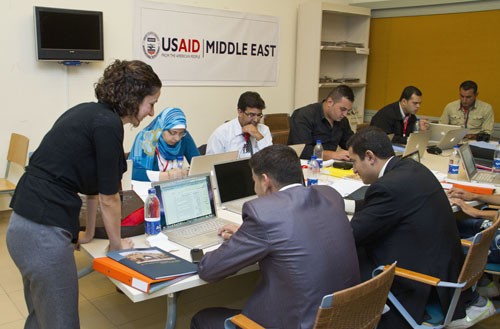
The United States has long supported a prosperous and democratic Middle East and North Africa. USAID’s Office of Middle East Programs (OMEP) directly responds to the needs expressed by people across the region. OMEP’s efforts in the region reflect our engagement with new partners and new generations. USAID’s regional programs complement our country-specific programs and increase their impact. Through OMEP’s Regional Partnership for Culture and Development, for example, USAID fosters regional knowledge sharing and intellectual innovation. This program partners with local, regional and international organizations to identify relevant research and analysis, commission applied development research where the need exists, and disseminate lessons learned to improve and inform development efforts around the region. The program supports USAID missions in the region with analysis and research in three focus areas: youth development and engagement, democracy and governance, and natural resources management, with an emphasis on water and climate change adaptation.
Governing Justly and Democratically
Transparent, accountable and responsive governance is critical to the democratic transitions that are underway in the region. Our assistance responds to the evolving needs expressed by citizens, and we are forging new partnerships directly with civil society, government officials and elected representatives. USAID strengthens the contributions of civil society as a whole, and women and youth in particular, by training and mentoring an empowered and professional media sector; promoting access to public information as the basis for good governance and public accountability; and improving the working environment for civil society organizations. Now more than ever, the region’s citizens are demanding greater transparency in decision-making, more inclusive governance, and better management of scarce natural resources such as water. Around the region, USAID has provided hundreds of bloggers, activists and journalists with hands-on training and research opportunities; trained over 200 senior government officials on public financial management-related topics; produced a TV drama emphasizing tolerance and critical thinking which attracted nearly 10 million viewers; improved the advocacy efforts of regional anti-corruption activists; and promoted the importance of access to information as a legal principle, leading to its inclusion in evolving regional legislation, including Morocco’s new constitution. Complementing bilateral assistance programs throughout the region, USAID’s regional programs support both the supply of, and demand for, good governance around the region.
Investing in Water and Natural Resources Management
Water is a major health issue and potential flashpoint in the region. Host to five percent of the world’s population, the region has only one percent of the world’s renewable freshwater. Declining water resources, increasing consumption, and poor management all limit regional development. Climate change has the potential to make a challenging situation worse. USAID is transforming the culture and governance of water throughout the region. We are also helping to increase the efficiency of water management and mitigate the impact of water scarcity for the region’s citizens by improving water resource management and enhancing policies and regulations promoting efficient water use. USAID helps regional water managers make better decisions related to water allocation and investment by providing innovative remote sensing tools harnessing NASA satellite observations and hydrological modeling to monitor the availability and use of water resources.
Promoting Inclusive Economic Growth
With over half of the MENA region’s population under the age of 24, and youth unemployment ranging from 20-25 percent, the region needs to create six million new jobs each year just to absorb new entrants to the labor market – about double what it has achieved in the past. Despite the tremendous potential offered by dynamic global economic forces, the region remains the least economically integrated in the world. Political stability depends on shared economic prosperity and inclusiveness, and OMEP supports regional initiatives and activities that open markets to wider opportunities for trade and investment. USAID has provided opportunities for nearly 200 companies in the region to engage with other firms to develop business relationships and increase cross-border trade. In addition, USAID partners with the International Monetary Fund-affiliated Middle East Technical Assistance Center to host training programs for regional government officials to develop skills in banking supervision, revenue administration and public financial management.







Comment
Make a general inquiry or suggest an improvement.